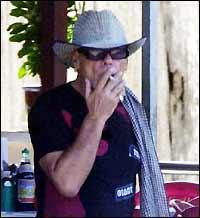Must Read IMHO
When does political speech become a crime punishable by imprisonment?
By Sarah Olson | AlterNet Jan 2, 2007
When the Army doesn't like what it hears. one journalist shares the battle she and her source face against censorship. In May of this year, I conducted an independent news interview with Ehren Watada while working as a freelance journalist.
Watada is a 1st Lieutenant in the U.S. Army and is the first commissioned officer to publicly refuse orders to deploy to Iraq. In his interview, Lieutenant Watada asserted that he had a duty as a U.S. Army officer to evaluate the legality of his orders and conduct himself accordingly. For this reason he said that he could not participate in the Iraq War because it was "manifestly illegal" and that his participation would make him a party to war crimes.
In June, Lieutenant Watada made national headlines when he refused to deploy to Iraq.
Lieutenant Watada continues to report for duty at Fort Lewis in the state of Washington while awaiting a February 2007 court-martial on one charge of "missing movement" and four charges of "conduct unbecoming an officer and a gentleman." Each of the latter four charges is based entirely on political speech. If convicted on all charges, Lieutenant Watada could spend up to six years in prison.
As an element of their prosecution, the U.S. Army has cobbled together portions of my interview with Lieutenant Watada and, together, these statements comprise the foundation of one charge of conduct unbecoming an officer. To substantiate this alleged crime, the U.S. Army has subpoenaed me to testify on behalf of the prosecution against my source. The dynamics of the situation are clear. When the military chooses to prosecute a soldier for expressing dissenting political positions to a member of the press, that journalist is unwittingly and inevitably forced into the middle of the conflict.
Among multiple issues this raises, the circumstance begs a central question: Doesn't it fly in the face of the First Amendment to compel a journalist to participate in a government prosecution against a source, particularly in matters related to personal political speech?
The intention is obvious. In the case against Lieutenant Watada, the U.S. Army is attempting to use a journalist as an investigative tool for their prosecution. In this case, the journalist is me. And I wholly object to this attempt at eliciting my forced and unconstitutional participation.
(read more)














0 Comments:
Post a Comment
<< Home